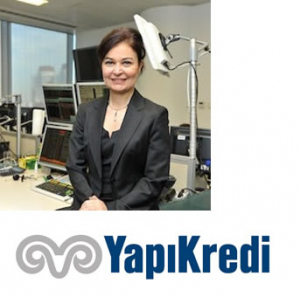EEL Events have been working with Yapi Kredi on our upcoming Turkey Private Equity and M&A Forum, taking place on 14-15 December 2022. Yapi Kredi will be joining the event as the Lead M&A Investment Bank Sponsor.
We have spoken with Bahar Sayiner, Head of Investment Banking, Yapı Kredi, about the M&A activity, trends and forecasts in Turkey.
Bahar Sayiner

Head of Investment Banking
Yapi Kredi
1.CAN YOU GIVE US AN OVERVIEW OF THE TURKISH M&A ACTIVITY OVER THE PAST YEAR, AND WHAT IS YOUR OUTLOOK FOR 2023?
After two years of the pandemic, 2022 was the first year we felt a normalization in our daily lives. The virus was still out there however we had fewer lockdowns, and fewer disruptions and we were all eager to get back to normal.
This was so for businesses as well. 2022 presented the opportunity for many of those who lost significant business to recover some of that back, operate without interruptions, and proceed towards a “normal”.
In the M&A market, 2022 turned out to be a good year with around $10 bn deal value as of November (source: Mergermarket, disclosed deals). We saw 2 mega deals with above 1bn$ deal value, one of which was the Türk Telekom transaction that constituted 30 percent of the total deal value. The energy sector with around $2.3 bn deal value was an important driver of the M&A activity. Followed by the technology sector, where technology and fintech deals constituted almost 18 percent of the total deal value.
However, with the onset of the war, the energy crises, inflationary pressures, and the lack of liquidity that ensued, doing business became tougher and more uncertain.
Mergers and acquisitions are inherently cyclical businesses. When the economy is strong and the outlook is positive, the deal volume goes up. In periods of uncertainty, companies do fewer deals. We started to feel the effects of this tougher deal-making environment starting from 2H 2022, and we expect it to continue into 1H 2023.
- WHAT WERE THE 2022 DEAL TRENDS?
We saw quite a lot of activity in the energy sector totalling around $2.3 bn. Here we’re seeing a portfolio reshuffling effect where, while certain investors are deciding to exit vis-à-vis recent regulatory developments in the sector, some others are looking to strengthen their foothold.
On the technology front, the shift to e-commerce which left a significant mark on the 2021 M&A activity, continued in 2022, albeit at a slowing pace. The Covid lockdowns forced not only the young population but even the internet-shy population to log in and place their orders for food and other necessities online. However, this trend slowed down with the lifting of the restrictions.
Along with e-commerce, e-mobility and gaming deals left their mark on the Turkish M&A scene in 2022. Overall 5 transactions in e-commerce, e-mobility, and gaming sectors recorded a $1.6 bn deal value.
FinTech was another notable trend in 2022. We saw 3 transactions recorded on the Mergermarket database, however since most activity in this sector involves small ticket deals that remain under the radar, this data is not indicative of the real picture. FinTechs continue to play an important role in shaping the future of the financial sector and Turkey continues to be a focal point for both local and international investors given the growth potential of its FinTech sector.
Lastly, I would like to touch upon the industrial sector M&As. On the industrial front, similar to 2021, companies with a strong export angle were top-rated. Deals in this sector were mostly small to mid-cap and involved strategic investors.
On the financial investor front, there were 22 deals. Local PE firms signed only a handful of deals. There were 5 trade exits and 2 IPOs. Most of the financial investor activity was on the venture capital and angel investor front.
- WHAT WERE THE DEAL MAKING CHALLENGES FACED IN 2022?
I would say one of the key challenges faced in 2022 was uncertainty and the fast pace of events. This has been our prevailing challenge since the onset of Covid. Just when we said things are about to move towards normal, the onset of the war rocked the boat once again.
Uncertainty increases the risk of failed deals. If the business environment or the availability of financing changes halfway to deal closing, then you’ll need to renegotiate valuation and deal terms all over again – this can be weary and frustrating – sometimes leading to disagreements among sellers and buyers.
Another challenge in 2022 was the continuously widening valuation gap between the sellers and the buyers. Availability and the cost of acquisition finance were some of the factors affecting the gap. Also, an equally important factor, was the differences in perspectives of the buyers and the sellers when evaluating risks attached to uncertainties. This issue can become especially important in deals where local sellers are faced with global buyers at times of limited visibility. Local buyers’ interpretation of uncertainties can be more optimistic than global buyers. In an ideal world, there should be little room for such interpretations in an M&A deal.
At Yapı Kredi, we try to overcome these hardships by structuring fast processes – as lean as possible – focused on getting to the finish line as quickly as possible. Also, we believe we create the most value for our clients by identifying buyers with the right strategic alignment and sufficient financial strength. What’s important for deal success in times of uncertainty is not reaching a “wide” audience but reaching the “right” audience.

